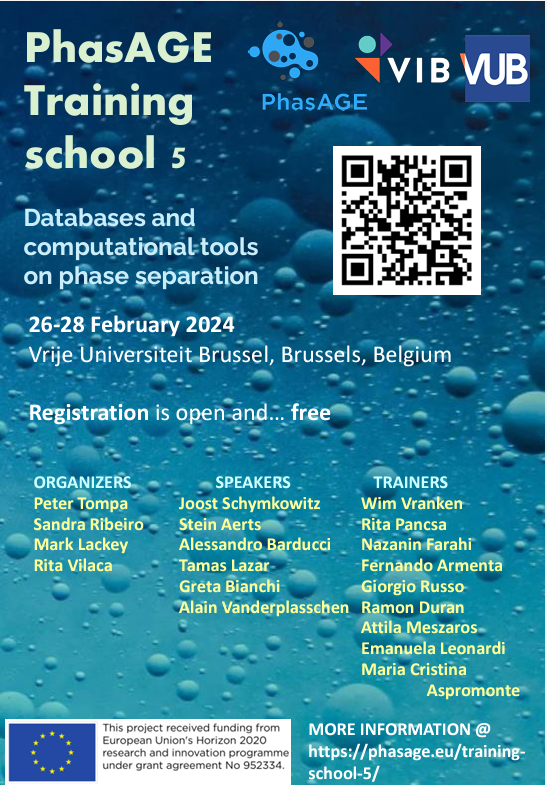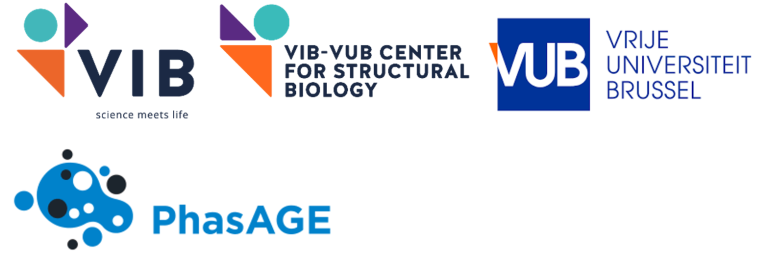PHASAGE
PhasAGE – Excellence Hub on Phase Transitions in Aging and Age-Related Disorders
Training SCHOol 5
Databases and computational tools on phase separation
26-28 February 2024
Brussels, Belgium
DESCRIPTION

After four successful editions, the PhasAGE consortium is pleased to announce the fifth Training School on “Databases and computational tools in phase separation”.
The event will take place at a PhasAGE member institution, in Brussels (Belgium) and the lead organizer of the Training School is Prof. Peter Tompa.
Target competences in brief: For members of the PhasAGE consortium and the selected external participants, the target of this Training School is on applying computational methodologies to study liquid-liquid phase separation (LLPS) and aggregation using in silico tools, databases and other resources.
More detailed overview: Participants will receive multidisciplinary training to gain deeper insights and practical experience in applying databases, in silico resources and computational tools to query relevant biological data and analyze it in context. Using integrative methodologies for studying both structured and intrinsically disordered proteins, trainees will investigate the LLPS and aggregation propensities of wild-type and mutant proteins in physiology and disease. The program integrates practical sessions with lectures by leading experts in the field from within and beyond the organizing consortiums. The schedule allows for plenty of networking and socializing opportunities for trainees in coffee breaks, at lunch and during the social dinner.
Keywords
protein structure, protein condensates, liquid-liquid phase separation, protein aggregation, disordered proteins, protein interactions, protein function, biological processes, databases, sequence-based prediction, bioinformatics, computational biology
PROGRAM
Monday, 26 February 2024
Hours | Topic |
09.00-09:30 | Welcome Session |
9.30-10:30 | Computational prediction and analysis of protein aggregation Joost Schymkowitz & Frederic Rousseau, VIB, KU Leuven, Belgium Invited Speaker |
10.30-11:00 | Introductions and Integration activity |
11.00-11:20 | Coffee break |
11:20-11:30 | Introductions and Integration activity |
12.30-13:30 | Lunch |
13.30-15:30 | Databases of protein disorder – DisProt, MobiDB, PED Maria Cristina Aspromonte, University of Padova, Italy Training |
15.30-16:00 | Coffee Break |
16.00-18:00 | LLPS and aggregation prediction Wim Vranken, VUB, IB2, Belgium Training |
Tuesday, 27 February 2024
Hours | Topic |
9.00-10:00 | AI tools in gene regulatory networks Stein Aerts, VIB, KU Leuven, Belgium Keynote Speaker |
10.00-10:30 | Coffee Break |
10.30-11:30 | Modeling biomolecular condensates at various resolutions Alessandro Barducci, CBS-CNRS, France Invited Speaker |
11.30-12:30 | Modeling and simulation of IDP ensembles Tamas Lazar, VIB-VUB Center for Structural Biology, Belgium Invited Speaker |
12.30-13:30 | Lunch |
13.30-15:30 | LLPS and aggregation-related databases Rita Pancsa, Institute of Molecular Life Sciences, Hungary Training |
15.30-16:00 | Coffee break |
16.00-17:00 | Tools of aggregation analysis Ramon Duran, VIB, KU Leuven, Belgium Training |
17.00-19:30 | Free time |
19.30 | Social Dinner |
Wednesday, 28 February 2024
Hours | Topic |
9.00-10:00 | Beware of the pattern! Hints into the relevance of charge patterns for protein conformation and LLPS Greta Bianchi, University of Milan, Italy Invited Speaker |
10.00-10:30 | Coffee Break |
10.30-11:30 | Fish herpesvirus infection driven by LLPS of a viral protein Alain Vanderplasschen, University of Liége, Belgium Invited speaker |
11.30-12:30 | Guided computational work on assigned project (target protein) – Group activity Rita Pancsa, Nazanin Farahi, Fernando Armenta, Giorgio Russo, Attila Meszaros, Maria Cristina Aspromonte, Emanuela Leonardi |
12.30-13:30 | Lunch |
13.30-15:00 | Guided computational work on assigned project (target protein) – Group activity Preparation of short presentations Rita Pancsa, Nazanin Farahi, Fernando Armenta, Giorgio Russo, Attila Meszaros, Maria Cristina Aspromonte, Emanuela Leonardi |
15.00-15:30 | Coffee Break |
15.30-17:30 | Group presentations |
17.30-17:45 | Closing session |
TARGET AUDIENCE AND REQUIREMENTS
The course is intended for MSc and PhD students and young researchers who are interested in learning how to query databases, use prediction tools, and analyze the results in the context of protein structure, function, and regulatory mechanisms. Participants must be able to navigate online biological resources but are not expected to have advanced computational or programming skills. Prior knowledge and basic training in some of the following scientific domains are recommended: biophysics, biochemistry, molecular biology, cell biology or related biosciences.
The course is limited to a reduced number of attendees to maximize active learning. Participants will be selected based on a short motivation statement and will receive a certificate of attendance at the end of the course.
LEARNING OUTCOMES
Participants will acquire the following skills:
– Knowledge of principles how complex signaling pathways get dysregulated in disease
– Knowledge of the biophysical mechanism of protein aggregation and phase separation
– Knowledge of querying curated databases and knowledgebases for protein disorder, aggregation and phase separation
– Knowledge and critical interpretation of predictions of protein liquid-liquid phase separation and protein aggregation
ORGANIZING COMMITTEE
Peter Tompa (VIB-VUB CSB, Belgium)
Sandra Ribeiro (IBMC/i3S, University of Porto, Portugal)
Mark Lackey (VIB-VUB CSB, Belgium)
Rita Vilaça (IBMC/i3S, University of Porto, Portugal)
TRAINERS
Wim Vranken (VIB, IB2, Belgium)
Attila Meszaros (VIB-VUB CSB, Belgium)
Giorgio Russo (VIB-VUB CSB, Belgium)
Fernando Durán Armenta (VIB-VUB CSB, Belgium)
Nazanin Farahi (VIB-VUB CSB, Belgium)
Ramon Duran (VIB, KU Leuven, Belgium)
Maria Cristina Aspromonte (University of Padova, Italy)
Emanuela Leonardi (University of Padova, Italy)
Rita Pancsa (Institute of Molecular Life Sciences, Hungary)
CO-ORGANIZING CONSORTIA

PhasAGE project is fully committed to gender balance by developing and supporting a diverse and inclusive community.
